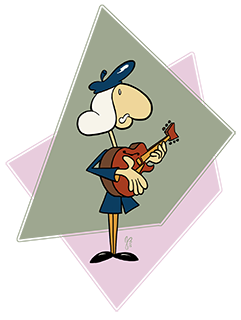I am not a singer and hate singing, BUT -- there are a number of exercises involving singing that will still help with jazz guitar. Some are more of a time investment than others, where you may feel it takes away from practicing more 'practical' things, but remember that singing is completely portable. Even just singing around the house washing dishes will keep you creatively developing melodic 'muscles' in your brain.
1) Sing when nobody is around the house or in your car.
Just coming up with melodies when you don't have your guitar is like calisthenics for the melody muscles in your brain. Imagine a chord or a bar in a standard you are learning and sing a line over it, or come up with a melody and imagine an arpeggiated chord behind it. Even if you have no idea what chords or notes you are singing, you are still connecting with the art and vibrations of improvisational music. Or just sing what comes in your brain -- your are still crossing that important bridge from brain to muscle.
2) Sing along to music while it is playing.
Sing along to jazz or even pop music, even if you are just improvising over the harmony. Try repeating phrases you hear in a solo on the fly. I like to do this driving to a session -- it's like my first warm-up. It makes my ear more more acute to what is going on. It exercises your listening muscles. Listening is as important as anything else playing jazz and singing back a line can give you instant feedback on how acutely you are listening.
3) Sing when you are playing a solo.
Try to sing along with your solo. This obviously helps with one of singing's biggest rewards: phrasing. It's not difficult to play sixteenth notes for 32 bars straight without a rest and the fact that you cannot sing along to such a solo should tell you something. Rests define melody as much as harmonic choices -- they are the 'negative space' that pop the melody out and encapsulate emphasis. Jazz, not to mention music as a whole, was largely developed by instruments which require human breath. Musical phrases often 'work' precisely because they emulate phrases of speech from a particular language. Stewart Copeland likes to explain that even the most complex 12/8 rhythms from the farthest reaches of the world are really just templates of phrases in the local dialect for "I went down to the corner store to buy some milk" or something similar. Even if it feels dumb, even if you are not playing the same note you singing, even if you are just grunting, even if you have never tried it -- try singing to your solos! You will be amazed at how your timing suddenly becomes more direct and fluid. Even non-melodic grunts will give your solo a 'conversational' reference point.
4) Play a chord, sing a line, play the chord again, play the line.
Even if you know you are going to stumble, do it. It exercises all your jazz muscles. It will take you out of the visual strategies you've built up eyeing where your fingers should go, what notes go with what chords, etc. This is something I saw Barney Kessel teach in a video. It helps build a personal vocabulary. It gives you lines with 'real' phrasing. It gives you a fresh and even personal perspective on improvisation over a harmony.
5) Play a note, sing a note, sing an interval of the note, play the interval.
This helps train your ears. Even if you are getting in the ballpark, you are working your ear, but pay attention to your progress.
6) Transcribe a solo and be able to sing every note.
Transcribing from a master is one of the most beneficial things you can do to help learn the language of jazz. This helps you really, really learn a solo. Transcribing it to your voice puts it in your body, not just your fingers. This exercise will also help you with your phrasing when you play it on guitar. This is an extreme exercise, but you will get results from it. When you are able to sing a solo, that solo is part of you, just like all those advertisement jingles and TV themes from your childhood.
You have probably heard someone talk about these exercises before so consider this is just a "blue-moon" reminder. It will wake up something very deep inside your improvisational ability. If you are like me, one reason you are playing instrumental guitar music is precisely because you *can't* sing (or rather don't sing well). Even if you can't sing, don't sing or won't sing, singing will still improve your guitar playing.

 RSS Feed
RSS Feed
